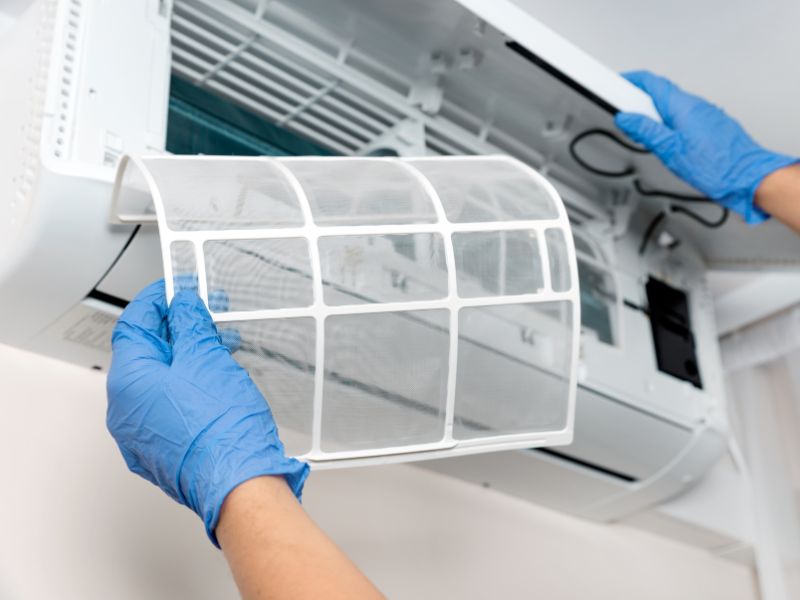How Often Should You Replace Your HVAC Filter for Optimal Performance?
When was the last time you thought about HVAC filter replacement? If you’re like most people, this critical maintenance task probably doesn’t cross your mind until something goes wrong with your heating or cooling system. Yet, regularly replacing your air filter is one of the simplest and most cost-effective ways to maintain excellent air quality, protect your HVAC components, and reduce energy bills. This comprehensive guide answers all your questions about furnace filter replacement, helps you select the right filter for your home, and shares tips that make this important task easy to remember.
Why HVAC Filter Replacement Matters More Than You Think
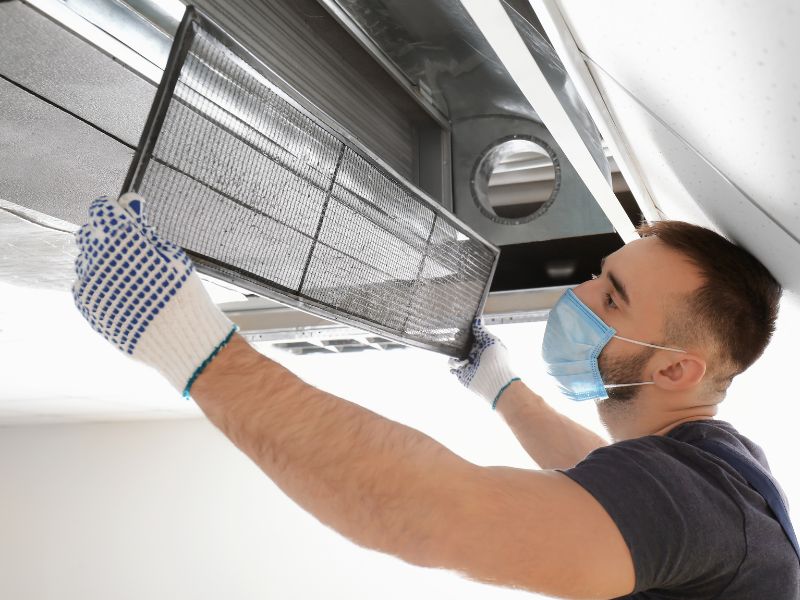
Your residential air filters work harder than you might realize. Every day, your HVAC system circulates thousands of cubic feet of air throughout your home, and your air filter serves as the first line of defense against contaminants. Understanding why HVAC filter replacement matters starts with knowing what these filters actually do:
Key Functions of Your Air Filter:
- Captures dust mites, bacteria, mold spores, and pet dander before they circulate through your living space
- Removes pollen, smoke particles, and countless other airborne particles
- Protects HVAC components from dirt and debris buildup
- Maintains proper airflow throughout your system
When filters become clogged with dirt, airflow becomes restricted, forcing your HVAC system to strain unnecessarily. A dirty filter can reduce your system’s efficiency by up to 15%, according to the U.S. Department of Energy. Heating and cooling efficiency is critical since these systems account for nearly half of home energy use. This inefficiency translates directly into higher utility costs and accelerated wear on expensive HVAC components. Most homes can avoid these problems entirely by establishing a simple HVAC filter replacement schedule.
Understanding MERV Ratings: The Key to Choosing Your Air Filter
When shopping for residential air filters, you’ll encounter the MERV rating, which stands for minimum efficiency reporting value. This industry-standard measure indicates how effectively a filter captures particles of different sizes. The MERV rating scale ranges from 1 to 16 for residential applications, with higher numbers indicating better filtration performance. The minimum efficiency reporting value rating system was developed by ASHRAE to help consumers compare filter effectiveness.
Recommended MERV Ratings for Residential Use:
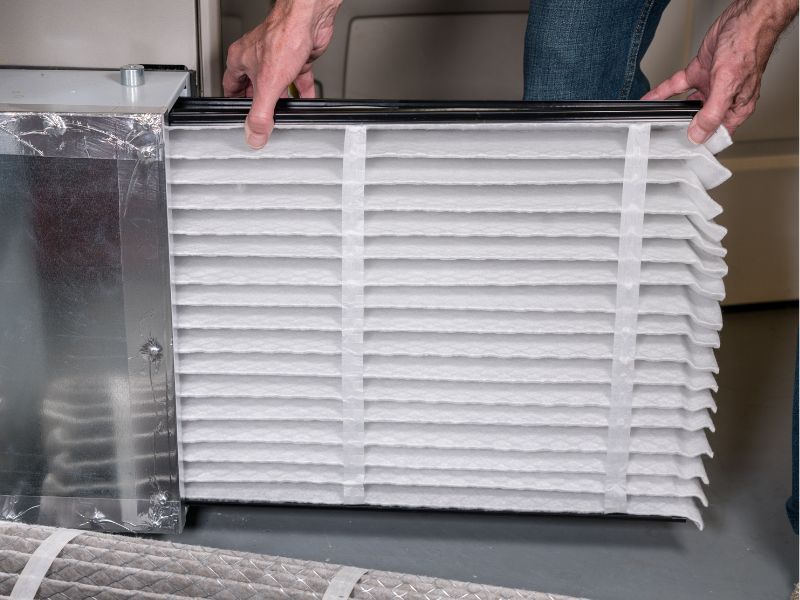
For most homes, experts recommend filters with a MERV rating between 8 and 13:
- MERV 8: Effectively captures larger particles like dust, pollen, and pet dander—ideal for standard residential use
- MERV 11: Offers better protection for homes with pets or mild allergy sufferers
- MERV 13: Provides the highest efficiency for households with severe allergies, respiratory issues, or those living in areas with poor air quality
However, choosing the right filter isn’t just about selecting the highest MERV rating available. Your HVAC system requires adequate airflow to function efficiently, and filters with very high ratings can restrict air movement. This restriction forces your furnace or air conditioner to work harder, potentially causing damage and increasing energy costs. Always check your system’s specifications before upgrading to ensure compatibility.
MERV Rating Comparison Table
| MERV Rating | Particle Size Captured | Best For | Replacement Frequency |
| MERV 8 | 3.0-10 microns | Most homes without special needs | Every 2-3 months |
| MERV 11 | 1.0-3.0 microns | Homes with pets or mild allergies | Every 2-3 months |
| MERV 13 | 0.3-1.0 microns | Allergy sufferers, respiratory issues | Every 1-3 months |
How to Determine the Right Filter Size for Your System
Before purchasing custom air filters or standard replacements, you need to know your filter sizes. Finding this information is straightforward:
Three Ways to Find Your Filter Size:
- Check the existing filter frame – Most filters have dimensions printed in length × width × depth format (e.g., 16×25×1 or 20×20×4)
- Measure it yourself – Use a tape measure if dimensions aren’t visible
- Consult your owner’s manual – System documentation lists filter specifications
Different sizes accommodate various system designs, and using the wrong size compromises both filtration effectiveness and airflow. Once you know your size, stock up on the correct filter options. Many retailers offer subscription programs that automatically deliver filters on a schedule you set, ensuring you never forget to change your filter again.
Step-by-Step Guide to HVAC Filter Replacement

Changing your air filter is one of the easiest home maintenance tasks you can perform, and it takes less than five minutes. Follow these simple steps to complete your HVAC filter replacement:
Step 1: Turn Off Your HVAC System. Safety first—always shut off the power to your heating or cooling unit before beginning. You can do this at the thermostat, circuit breaker, or using the switch located near your furnace.
Step 2: Locate the Filter Compartment. Find where your filter is installed. In most homes, you’ll discover it in one of three locations: inside the return air grille on a wall or ceiling, in the blower compartment of your furnace, or in a dedicated filter cabinet between the return duct and your HVAC unit.
Step 3: Remove the Old Filter. Open the access panel and carefully slide out the dirty filter. Notice the arrow printed on the filter frame—this indicates the direction of airflow and is important when installing your new filter. Place the old filter in a trash bag immediately to prevent dust and dirt from spreading throughout your home.
Step 4: Inspect the Filter Compartment. Before installing the new filter, take a moment to wipe away any dust or debris from the filter housing. This quick cleaning step helps maintain optimal airflow and system performance.
Step 5: Install Your New Filter. Remove the new filter from its packaging and check for the directional arrow. This arrow should point toward your furnace or air handler—in the direction of airflow through your system. Slide the filter into place, ensuring it fits snugly with no gaps around the edges.
Step 6: Secure and Restart. Close the access panel, restore power to your system, and you’re done! Mark your calendar or set a reminder for the next replacement date, typically 30-90 days, depending on your filter type and home environment.
How Often Should You Perform HVAC Filter Replacement?
The question of frequency comes up constantly, and the answer depends on several factors specific to your home. Here’s what you need to know:
Standard Replacement Timeline
Most people should check their air filter monthly and plan to replace it every 30 to 90 days. This range exists because:
- Basic fiberglass filters typically need replacing every month
- High-quality pleated filters can last up to three months
- Your home’s specific conditions affect filter lifespan
Factors That Require More Frequent Changes
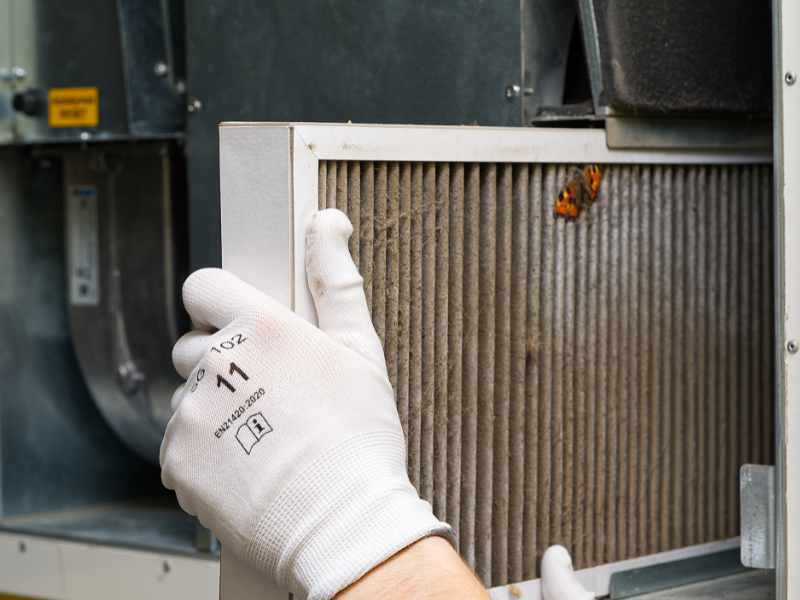
Monthly Replacement Needed:
- Homes with pets (dogs or cats that shed)
- Tobacco smokers in the residence
- Recent home renovations or construction nearby
Every 30-45 Days:
- Family members with allergies or respiratory conditions
- Living in dusty, dry climates
- Continuous HVAC system operation
Every 60-90 Days:
- Standard homes without pets or special conditions
- Moderate HVAC usage
- High-quality pleated filters (MERV 8-13)
Warning Signs to Check Your Filter Early
Don’t wait for your scheduled replacement date if you notice:
- Visible dust or dirt buildup on the filter surface
- Reduced airflow from your vents
- Increased dust on furniture and surfaces
- Higher than normal energy bills
- Strange odors when the system runs
- Family members experiencing more allergies or respiratory issues
The Complete Cost-Benefit Analysis of Regular Filter Changes
Understanding the financial impact of HVAC filter replacement helps most people prioritize this simple maintenance task. While quality air filters cost $5 to $30 each, depending on size and efficiency, the money you save far exceeds this modest investment.
Direct Cost Savings
Regular filter changes reduce your heating and cooling costs by maintaining optimal airflow. The U.S. Department of Energy reports that replacing dirty filters with clean ones can lower your HVAC system’s energy consumption by 5-15%. For a home spending $150 monthly on heating and cooling, that’s potentially $90-$270 saved per year.
Equipment Protection and Longevity
Neglecting HVAC filter replacement leads to expensive consequences:
Repair Costs:
- Professional HVAC repairs typically start at $150-$450
- Major component failures can cost $300-$700 or more
- Complete system replacement ranges from $5,000 to $12,500
Compare these figures to spending $40-$180 annually on filters, and the value becomes crystal clear.
Filter Types and Price Comparison Table
| Filter Type | Average Cost | Lifespan | Annual Cost | Best Use Case |
| Fiberglass | $1-$5 | 30 days | $12-$60 | Budget-conscious, minimal needs |
| Pleated (MERV 8) | $8-$15 | 90 days | $32-$60 | Standard homes |
| Pleated (MERV 11-13) | $15-$30 | 60-90 days | $60-$180 | Allergies, pets, better air quality |
Health Benefits of Proper Air Quality Management
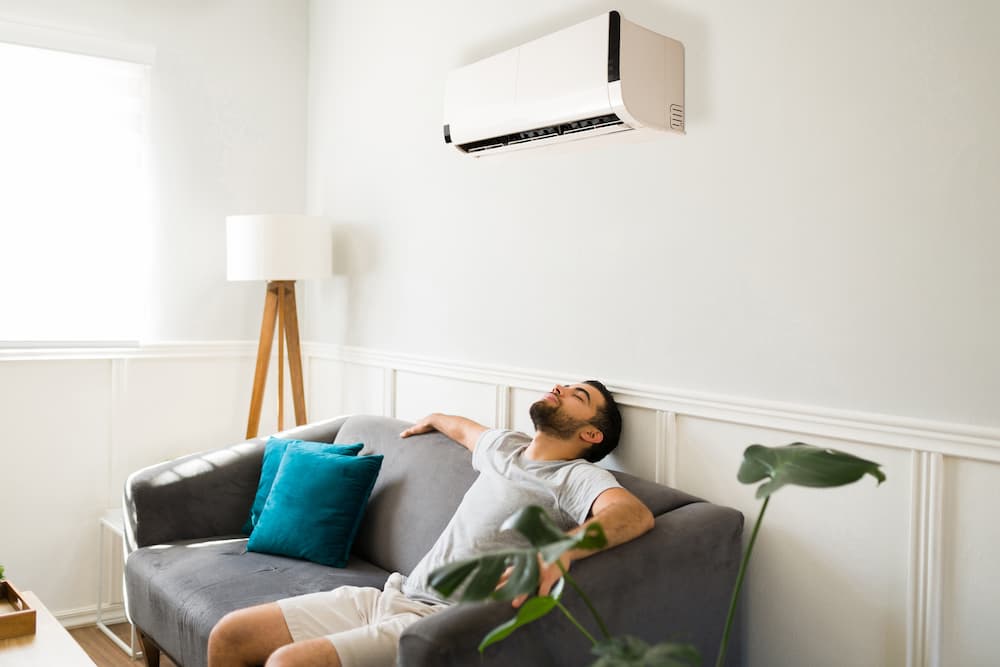
Beyond cost savings, regularly replacing your furnace filter delivers significant health benefits for residents. Indoor air quality directly impacts your family’s well-being, and clean filters play a crucial role in removing harmful contaminants. According to the EPA, indoor air pollutants can be 2-5 times higher than outdoor levels, making proper filtration essential.
Key Health Benefits:
- Allergen Reduction: Air filters with appropriate MERV ratings trap pollen, dust mites, pet dander, and mold spores, reducing symptoms like sneezing, congestion, and itchy eyes
- Protection from Harmful Particles: Modern filters remove bacteria, virus carriers, smoke particles, and other airborne contaminants
- Improved Sleep and Productivity: Clean air contributes to better sleep quality, improved focus, and higher energy levels
- Respiratory Support: Particularly important during cold and flu season or in areas affected by wildfire smoke
Many residents notice improvement in their breathing and overall comfort within days of installing a new filter.
Common HVAC Filter Replacement Mistakes to Avoid
Even though changing filters is straightforward, several common mistakes can reduce effectiveness or damage your system:
Critical Mistakes to Avoid:
- Installing Filters Backward: The directional arrow must point toward your furnace or air handler. Installing backward restricts airflow and reduces efficiency
- Choosing the Wrong Size: Filters too small leave gaps where unfiltered air passes through; too large won’t fit properly
- Using Incompatible MERV Ratings: Higher isn’t always better—filters with ratings too high for your system restrict airflow and may cause damage
- Running Without a Filter: Never operate your system without a filter, even temporarily. Unfiltered air allows dirt accumulation on sensitive components
- Forgetting to Set Reminders: Use calendar alerts, automatic delivery services, or thermostat notifications to stay on schedule
Advanced Filter Options Worth Considering
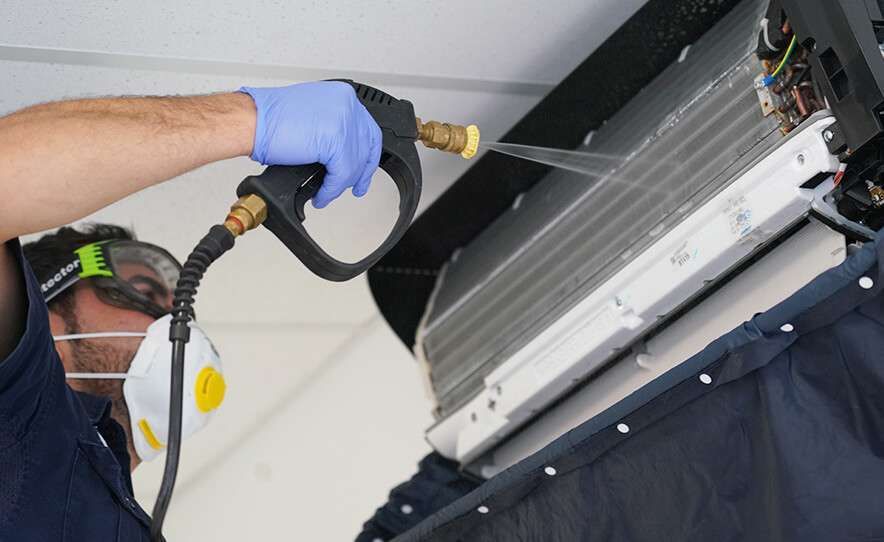
While standard disposable filters work well for most homes, several advanced options offer additional benefits:
Alternative Filter Options:
| Filter Type | Lifespan | MERV Range | Best For | Considerations |
| Custom Air Filters | 30-90 days | 8-13 | Non-standard sizes | Slightly higher cost, perfect fit |
| Washable/Reusable | 5+ years | 4-8 | Eco-conscious homes | Requires monthly cleaning, lower efficiency |
| Electronic Air Cleaners | Years (requires cleaning) | Equivalent to 16+ | Maximum purification | Higher upfront cost, removes 99%+ particles |
For those seeking the ultimate in air purification, electronic air cleaners use electrical charges to capture particles. Learn more about advanced options in our HVAC filters guide.
Creating Your Personal Filter Replacement Schedule
Developing a consistent HVAC filter replacement routine doesn’t have to be complicated:
Four Simple Steps:
- Document Your System Details: Record filter size, recommended MERV rating, and preferred brand. Take a photo on your phone for easy reference
- Choose Your Reminder Method:
- Set recurring calendar alerts
- Subscribe to automatic filter delivery
- Enable smart thermostat reminders
- Mark dates on a physical calendar
- Buy in Bulk: Purchase a year’s supply to save money and ensure availability. Store in a dry location
- Track Your Results: Keep a simple log noting change dates and system performance observations to fine-tune your schedule
Seasonal Considerations for HVAC Filter Replacement
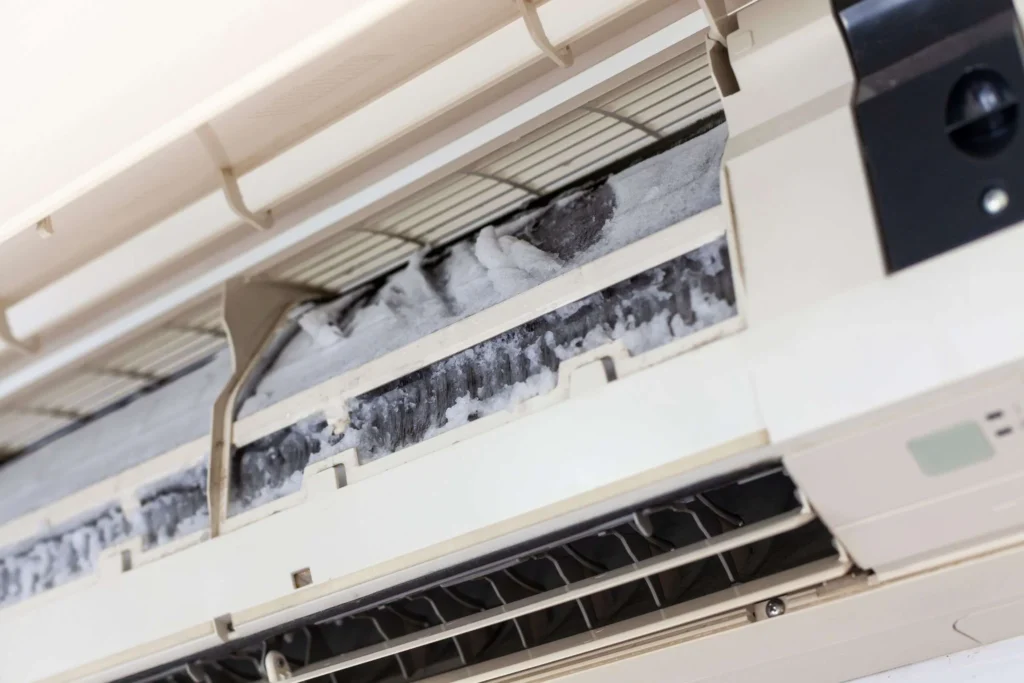
Different seasons place varying demands on your heating and cooling system, affecting how often you should perform HVAC filter replacement:
| Season | System Demand | Key Considerations | Recommended Action |
| Spring | Moderate | High pollen levels | Check monthly; allergy sufferers change more frequently |
| Summer | High (cooling) | Constant AC operation, high humidity | Check monthly; replace more frequently if needed |
| Fall | Moderate | Transitional period | Standard schedule works well |
| Winter | High (heating) | Furnaces run constantly, closed windows mean more recirculation, and holiday cooking | Check monthly; expect faster saturation |
Professional HVAC Maintenance and Filter Replacement
While changing filters yourself is easy and recommended, professional HVAC maintenance provides additional value. Annual or bi-annual professional service includes:
- Filter inspection and replacement
- Comprehensive system checks
- Component cleaning
- Performance testing
- Issue identification before problems escalate
Professional technicians examine your entire HVAC system, ensuring efficient operation and catching small problems before they become expensive repairs. Many homeowners schedule service in spring and fall—before heating and cooling seasons—to ensure peak performance.
At Callidus Air, our experienced technicians understand the critical importance of proper HVAC filter replacement and comprehensive system maintenance. We can recommend the ideal filter type for your needs, establish a customized maintenance schedule, and ensure your system operates at peak efficiency year-round.
Helpful Resources:
- How HVAC Systems Work
- Reduce Your HVAC Energy Bills
- Proper HVAC System Sizing
- How to Improve Indoor Air Quality
- HVAC Basics Guide
Environmental Impact and Smart Home Integration
Making environmentally conscious decisions about HVAC filter replacement contributes to sustainability:
- Waste Reduction: Millions of disposable filters end up in landfills annually. Washable filters dramatically reduce this impact
- Eco-Friendly Options: Some manufacturers produce filters using recycled or sustainable materials with performance equal to traditional options
- Energy Efficiency: Proper filter maintenance reduces energy consumption, decreasing your home’s carbon footprint
Smart Home Technology
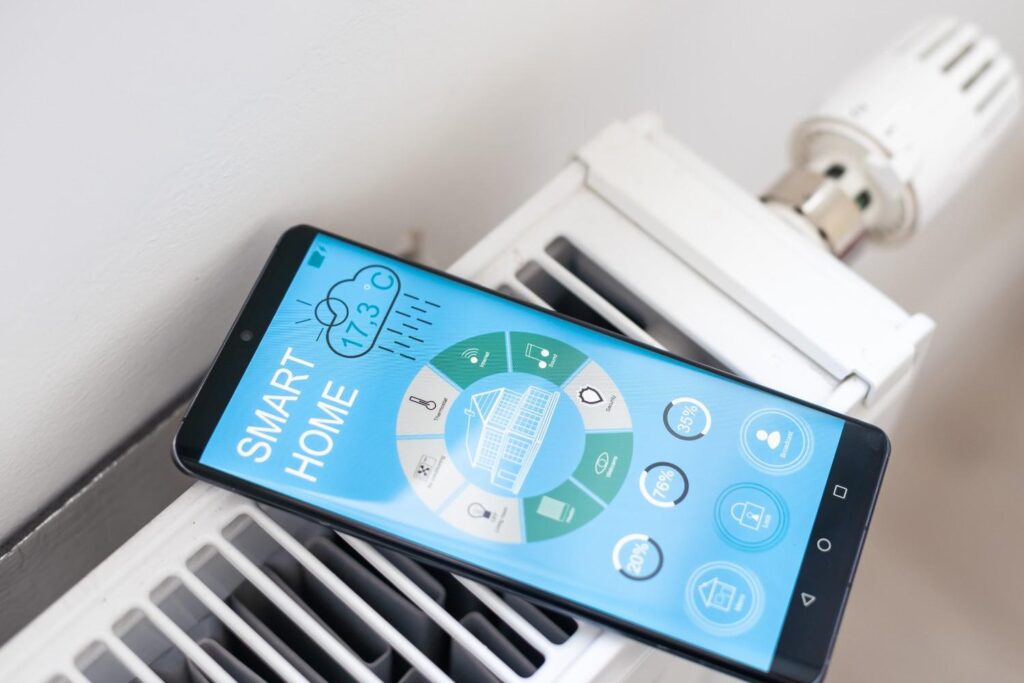
Modern technology makes tracking HVAC filter replacement easier than ever:
- Smart Thermostats: Monitor actual system runtime and alert you when replacement is truly needed based on data rather than arbitrary dates
- Filter Sensors: Measure resistance and alert you when airflow restriction reaches specific thresholds
- Automated Ordering: Smart home assistants can coordinate with retailers to automatically reorder and deliver filters before you run out
The Bottom Line: Making HVAC Filter Replacement a Priority
HVAC filter replacement represents one of the simplest, most cost-effective maintenance tasks you can perform to protect your home comfort investment. This straightforward job takes just minutes but delivers substantial benefits: improved air quality, reduced energy costs, extended equipment life, and better health for your family.
Whether you choose basic fiberglass filters or high-efficiency pleated options, the most important thing is establishing and maintaining a consistent replacement schedule. Set reminders, buy filters in advance, and make this task a regular part of your home maintenance routine.
Ready to optimize your HVAC system’s performance and improve your home’s air quality? Contact us today at Callidus Air for expert guidance on selecting the perfect filters for your system and establishing a maintenance plan tailored to your needs. Our team of professionals is here to help you breathe easier and keep your system running efficiently for years to come. Don’t wait until a dirty filter causes problems—take action now to protect your investment and your family’s comfort.
Frequently Asked Questions About HVAC Filter Replacement
When it comes to HVAC filter replacement, customers often have questions about features, costs, and scheduling. This FAQ section provides clear answers to help you apply the right maintenance practices and continue enjoying a clean, efficient system.
How do I know when my HVAC filter needs replacement?
Check your air filter monthly by removing it and holding it up to the light. If you can’t see light passing through or the filter appears gray or dark with accumulated dust, it’s time for replacement. Additionally, watch for signs like reduced airflow, increased dust in your home, or higher energy bills. Most standard filters should be changed every 30-90 days, depending on filter type, home conditions, and system usage.
Can I use a higher MERV rating than my system recommends?
Using a filter with a MERV rating higher than your system is designed to handle can restrict airflow, forcing your HVAC unit to work harder. This added strain can increase energy costs, reduce system efficiency, and potentially lead to component damage over time. Always consult your system’s specifications or an HVAC professional before upgrading to higher-rated filters to ensure compatibility.
What’s the difference between a furnace filter and an air filter?
These terms are used interchangeably because they refer to the same component. Whether your system provides heating, cooling, or both, the filter serves the same purpose: removing airborne particles from air circulating through your HVAC system. Some people refer to it as a furnace filter during the heating season and an air filter when discussing air conditioning, but it’s the same filter performing the same job year-round.
Are expensive filters worth the extra cost?
Higher-quality filters with better MERV ratings typically cost more but provide superior filtration, capturing smaller particles and allergens that cheaper filters miss. For homes with allergy sufferers, pets, or respiratory concerns, investing in better filters often proves worthwhile through improved air quality and health benefits. However, even basic filters work well if changed regularly, so consistency matters more than price. The best filter is one that fits your needs and gets changed on schedule.
How does proper filter maintenance impact my energy bills?
A clean filter allows unrestricted airflow through your HVAC system, enabling efficient operation. When filters become clogged with dirt and debris, your system must work harder to push air through the restriction, consuming more energy. According to the U.S. Department of Energy, regularly replacing dirty filters with clean ones can lower your HVAC system’s energy consumption by 5-15%, resulting in noticeable savings on monthly utility bills. Over a year, these savings easily exceed the cost of replacement filters.

